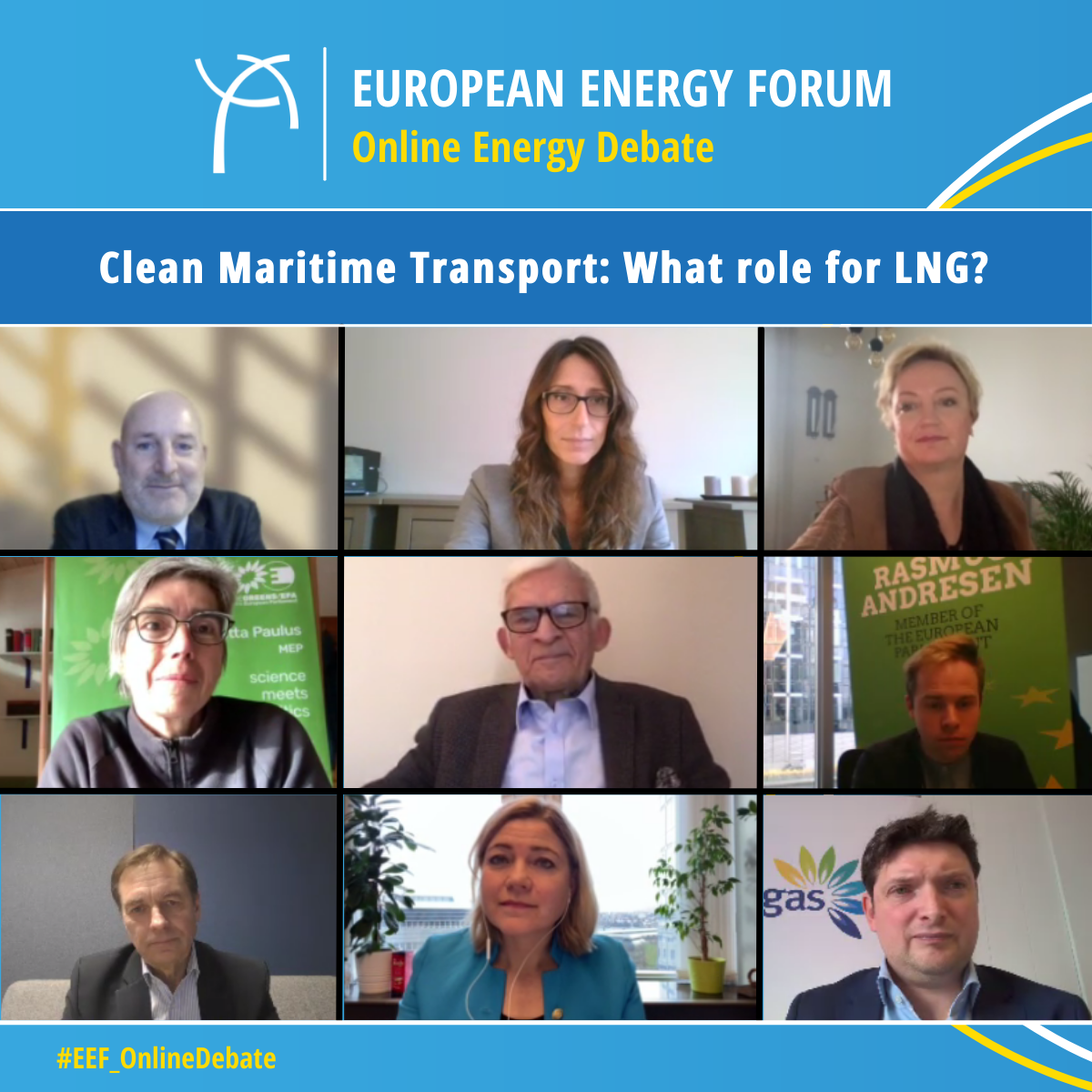Clean Maritime Transport: What role for LNG?
Co-Chairs:
MEP Jerzy Buzek (EPP, Poland), President of the EEF
MEP Henna Virkkunen (EPP, Finland), Active Member of the EEF
Speakers:
James Watson, Secretary General, Eurogas
Kari Hietanen, Executive Vice President, Corporate Relations and Legal Affairs, Wärtsilä
Sandro Santamato, Head of Unit “Maritime Transport and Logistics”, DG MOVE, European Commission
Panellist MEPs:
Rasmus Andresen (Greens/EFA, Germany)
Elsi Katainen (RE, Finland)
Jutta Paulus (Greens/EFA, Germany)
Moderator: Pascale Verheust, Director General of the EEF
December opened with an Online Energy Debate on the decarbonization of the maritime transport sector co-chaired by the EEF President MEP Jerzy Buzek and the EEF Active Member MEP Henna Virkkunen, EPP shadow rapporteur for the FuelEU Maritime file in the ITRE Committee.
In their introductory remarks, the co-chairs underlined the importance of maritime transport both globally and in the EU. As of today, shipping relies entirely on fossil fuels, meaning transformative changes are needed for the sector to play its part in reducing emissions. Because of the sector’s global dimension, particularly attention is required to ensure the decarbonization does not negatively affect the EU maritime transport competitiveness at international level.
James Watson, Secretary General of Eurogas, explained why the association believes LNG has a role to play in decarbonizing the maritime transport, starting from the absence of any other economically viable zero-emission powertrain technology, as recognized by the Alternative Fuels Infrastructure Regulation proposal. Since LNG can be decarbonised through blending or substituted with liquefied biomethane, renewable and low-carbon synthetic gaseous e-fuels, it can allow for a gradual shift towards decarbonised fuels without causing any carbon lock-in effects. The switch to LNG would also offer immediate environmental benefits, namely a reduction in GHG, NOx, SOx and particulates emissions: if the entire global maritime sector was to switch to LNG, this would already lead to a 15% GHG emissions reduction, Mr Watson told us. According to him, the FuelEU Maritime proposal is a good means to foster the sector’s decarbonization. What is key is ensuring it is consistent with the rest of the Fit for 55 Package, particularly the Alternative Fuel Infrastructure Regulation proposal and the proposed review of REDII.
Kari Hietanen, Executive Vice President, Corporate Relations and Legal Affairs of Wärtsilä, offered an overview of the current technology landscape and shared some thoughts on how it is likely to evolve in the future. Today, available traditional options are diesel and heavy fuel oils, with solutions like LNG, bio- and synthetic methane being only limitedly available. Hydrogen blending is due to become more and more common, while 100% green hydrogen and ammonia concepts still need to be developed, hopefully soon. Having a clear understanding of fuel availability is crucial when making an investment decision: not only do different fuels have different costs; they also impact the vessel structure as the tank size varies based on the fuel used. In the future, Mr. Hietanen believes instead of one single solution, there will be many. Fuel flexibility and dual fuel solutions will be important and the sector’s decarbonization should be underpinned by a technology neutrality approach. Mr. Hietanen finally presented one of the most environmentally friendly ship in use, showing that by integrating different technologies, reducing shipping emissions is indeed possible.
Sandro Santamato, Head of Unit “Maritime Transport and Logistics” at DG MOVE, European Commission, said the maritime transport must reduce its emissions by up to 90% by 2050 to be in line with the climate-neutrality objective: big efforts are required in using both less and cleaner energy. The EU already had measures in place to foster low-carbon and renewable fuel production and distribution – the REDII and the Alternative Fuels Infrastructure Directive. The FuelEU Maritime is the missing piece targeting demand, whose increase is key to creating a business case for investments in production and distribution. Based on technology neutrality, the legislative proposal aims at garanteeing a fair comparison between different fuel solutions by accounting for CO2, methane and NOx emissions, as well as by adopting a life-cycle approach. The clear targets set in time, the compliance with them being calculated on average through the years and possible to be achieved in a pool are also important aspects, as they provide both predictability and flexibility to operators.
These initial interventions were followed by an open exchange between the speakers, co-chairs and other key MEPs personally working on the file: MEPs Rasmus Andresen, Rapporteur for opinion in ITRE, Elsi Katainen, Shadow rapporteur in TRAN Committee and Jutta Paulus, Shadow rapporteur in TRAN and ENVI Committees. They agreed that several fuel options will be required, but offered different perspectives on which these should be, some welcoming the transition role of LNG and bioLNG, others bringing in more scepticism. They also recognised the need of putting in place clear measures to support research and innovation, incentivise investments and safeguard the EU shipping competitiveness, as well as the importance of continued discussions with and among all involved stakeholders.



